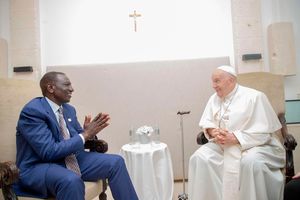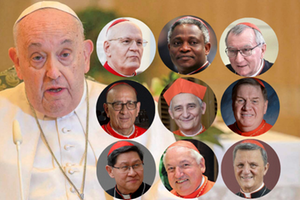
This photo taken and handout on April 18, 2019 by the Vatican press office, Vatican Media, shows Pope Francis kisses an inmate's foot as he washes the feet of inmates at the Velletri prison, south of Rome, during the Holy Thursday celebrations. - Maundy Thursday is the Christian holy day falling on the Thursday before Easter, commemorating the Maundy and Last Supper of Jesus Christ with the Apostles, as described in the canonical gospels.
On Monday morning, news broke around the globe: Pope Francis had died. Although the announcement was not entirely unexpected—he had struggled with health issues in recent years—his passing marks the end of a papacy that, by any standard, has left a profound imprint on the church and the world.
For 12 years, this Argentine pontiff—the first from the Americas, the first Jesuit and the first non-European pope in over 1,200 years—reshaped the church’s tone, priorities and pastoral imagination.
His death invites us to reflect on a legacy defined not by doctrinal revolution, but by a radical insistence on mercy, inclusion and the courage to confront once-taboo questions. To understand his impact, we must look beyond Rome to the peripheries he cherished: to the slums of Nairobi, the Amazonian rainforests and the lived struggles of ordinary believers.

President Willliam Ruto with Pope Francis at the 50th G7 Summit, held at Apulia in Italy.President Ruto is one of the five African leaders invited to attend the 50th G7 Summit, held at in Italy.
When Jorge Mario Bergoglio emerged on the balcony of St Peter’s Basilica in 2013, his choice of the name Francis—after Assisi, the saint of poverty and simplicity—signalled a break from tradition. Unlike his predecessors, John Paul II and Benedict XVI, whose intellectual heft and European roots anchored them in the church’s Eurocentric legacy, Francis brought the perspective of the Global South.
Born in Buenos Aires to Italian immigrants, he witnessed first-hand the scars of inequality, political turmoil, and the existential questions facing marginalised communities. This shaped his vision of a church that “goes forth” to the margins, a theme crystallised in his 2013 Evangelii Gaudium: “I prefer a Church which is bruised, hurting and dirty because it has been out on the streets, rather than a Church… caught up in a web of obsessions and procedures.”
His papacy was a rebuke to clericalism and complacency. He washed the feet of prisoners, embraced refugees in Lesbos and denounced the “globalisation of indifference” toward migrants. For African Catholics, this resonated deeply. In Kenya, where faith communities grapple with poverty, corruption and inter-religious tensions, Francis’s emphasis on social justice—echoing the spirit of Kenya’s own Cardinal Maurice Otunga.

To appreciate Francis’s uniqueness, we must contrast him with John Paul II and Benedict XVI, his immediate predecessors.
John Paul II, who died in 2005, was a towering global figure: a philosopher-poet, charismatic leader, and tireless traveller who helped bring down communism in Eastern Europe. His papacy was marked by a personalist theology, youthful energy and dramatic gestures. When he died, cries of “Santo Subito!” (make him a saint immediately!) rose from the crowds in St Peter’s Square.

His successor, Pope Benedict XVI, brought a quieter, more contemplative presence. A brilliant theologian, Benedict focused on liturgical renewal, defending the faith against relativism and deepening the church’s understanding of Vatican II. He was the first pope in over 600 years to resign from office, citing failing health.
Then came Francis. From the outset, he embraced a different style: pastoral, informal, often spontaneous. He opted for simplicity, shunned the papal palace, and championed a “church of the poor and for the poor.”
What truly set Francis apart was the kind of conversations he allowed to happen in the church—many of which had long been considered closed, taboo, or too sensitive. He did not change church doctrine. But he changed the tone and emphasis, shifting from rules to relationships, from judgment to mercy, from silence to dialogue.
Perhaps most emblematic of his approach was Amoris Laetitia (2016), which addressed the pastoral care of families. It sparked global debate over whether divorced and remarried Catholics could receive Communion. Instead of issuing a clear “yes” or “no,” he emphasised pastoral discernment and individual conscience. This left the door open to sacramental inclusion in some cases.
Likewise, Querida Amazonia (2020), a reflection on the Amazon Synod, raised hopes (or fears) that the Pope might approve the ordination of married men in remote regions. Instead, he sidestepped the issue, calling for greater lay leadership but stopping short of changing discipline.
In 2023, the document Fiducia Supplicans, approved by Francis, permitted informal, non-liturgical blessings for same-sex couples and couples in “irregular” unions. While it insisted such blessings were not an endorsement of sinful behaviour or alternative marriage models, it caused an uproar, particularly in Africa, Eastern Europe and parts of Asia. Several bishops’ conferences flatly rejected the document, arguing that in their context, it would be interpreted as validating sin.
Yet even here, Francis seemed less interested in consensus than in compassion. The logic behind Fiducia Supplicans was not doctrinal innovation, but pastoral accompaniment. In a church he often described as a “field hospital,” the first duty is to tend to wounds, not to ask for moral credentials.

One of Francis’s most quoted lines came early in his pontificate, during his first Chrism Mass in 2013: “This is what I am asking you—be shepherds with the smell of the sheep.” It was a direct challenge to priests and bishops to be present among the faithful, especially the poor and marginalised. It reflected his deep belief that the church must not be a fortress but a tent, not a tribunal but a family home.
Critics have accused Francis of emphasising mercy without repentance, inclusion without conversion. Some theologians argue that his open-ended phrasing and improvisational style have muddied doctrinal waters.
But he has also reminded the Church that people do not live in neat moral categories. His focus has consistently been on the concrete lives of people—messy, wounded, complex.

So, has the church changed under Pope Francis? In some ways, no. He has not altered a single core doctrine on faith or morals. But in other ways, yes. He has changed how the church speaks, listens, and presents herself.
Pope Francis may not have always spoken with scholastic clarity, but he spoke with the heart of a pastor. He reminded the church of her deepest identity—not as a fortress of the perfect, but as a home for the wounded. He was, in the end, a shepherd who smelled like the sheep.
Fr Mutuku is OP, Director, Institute of Social Communication, Tangaza University.








